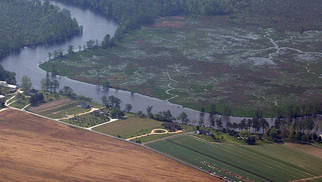Absence Of Government Regulation Redistributes Wealth From Fishermen To Farmers, Home Owners

By Matthew Cameron
In the latest installment of why appropriate government regulation is extremely important to the maintenance of a sustainable agricultural system, here's the Washington Post reporting about the current state of the Chesapeake Bay:
A giant underwater "dead zone" in the Chesapeake Bay is growing at an alarming rate because of unusually high nutrient pollution levels this year, according to Virginia and Maryland officials. They said the expanding area of oxygen-starved water is on track to become the bay's largest ever. [...]
That's bad news for biologists who monitor the bay and horrible news for oysters and fish. Dead zones suck out oxygen from deep waters and kill any marine life that can't get out of the way.
The article goes on to note that the EPA is attempting to do something about this sorry situation by mandating a "pollution diet" for the five states in the Chesapeake Bay Watershed. This is being fought tooth-and-nail, however, by those responsible for much of the pollution:
[T]he plan is being challenged by two powerful lobbies and other groups that are seeking a court order to block it. The American Farm Bureau Federation argued that costly conservation requirements could drive farmers in the Chesapeake Bay watershed out of business, and that states — not the EPA — should determine pollution limits.
The group's lawsuit in a federal district court in Harrisburg, Pa., asks a judge to stop the plan from going forward. The National Association of Home Builders recently joined the suit.
This case reveals yet another pernicious effect of inadequate government regulation. Not only does it doom Chesapeake Bay wildlife and unfairly transfer wealth from future generations to current residents by allowing for the overexploitation of natural resources, but also it amounts to a huge subsidy for certain economic constituencies at the expense of others. Farmers and home owners derive tremendous benefit from being given carte blanche to use the Chesapeake Bay as a reservoir for the nutrient runoff that they produce through animal feeding operations and lawn treatment routines, respectively. Yet it's fishermen who are being asked to pay for this in the form of reduced incomes that have resulted from the steady decline of seafood catches.


Matthew Yglesias's Blog
- Matthew Yglesias's profile
- 72 followers



